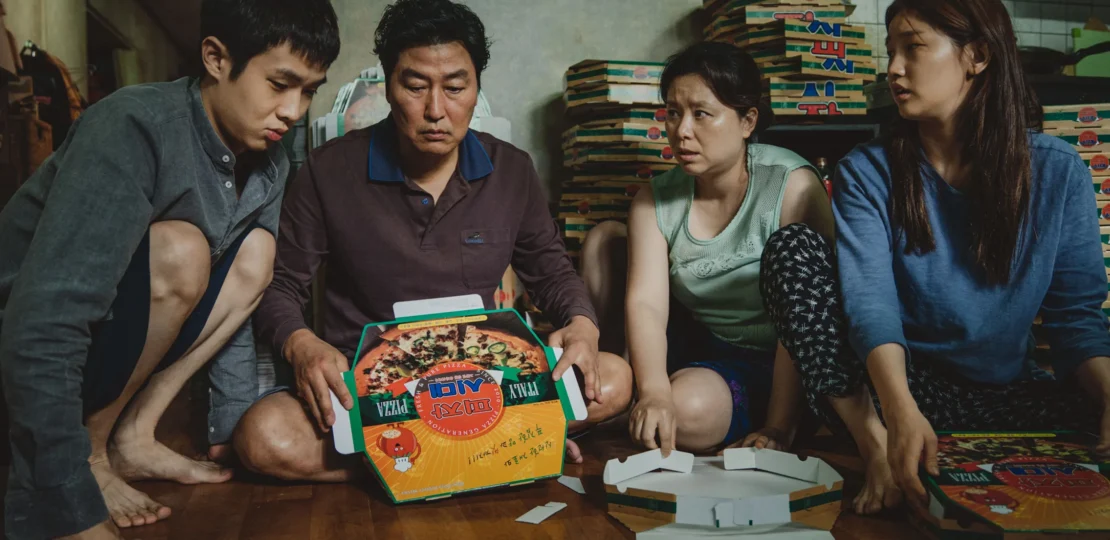
At its soul, Parasite (2019) is the tale of two families: the resourceful but poor Kims and the naive, wealthy Parks. The Kims live in a damp, basement apartment—folding pizza boxes for spare change. The Parks, meanwhile, enjoy their days in a sunlit architectural dream of a mansion.
When Ki-woo, the eldest Kim son, seizes a job tutoring the Park daughter, a door opens—and the Kims pour in like smoke. Each family member carves a role in the Park household, pushing aside existing staff with forged documents and meticulously orchestrated lies.
And for a moment, it all seems perfect.
Comedy Becomes Chaos
The first half plays like a dark comedy, a con-artist symphony that makes you grin at every clever twist. But Parasite (2019) isn’t here to play safe.
Midway through, the ground shifts—literally and metaphorically. Without spoiling the shock (and trust me, you’ll feel it in your gut), the movie takes a brutal turn into thriller territory, exposing a deeper layer of secrets buried beneath the Parks’ luxurious home.
The shift is surgical—you don’t notice the tension tightening around your throat until you’re gasping.
A Visual Allegory of Class Warfare
Visually, Parasite (2019) is a masterclass. The stark contrast between the sun-drenched Park mansion and the flooded Kim basement tells its own story. Stairs, basements, elevations—everything in this film is symbolic.
Even rain is used with devastating irony. For the Parks, it’s a romantic evening. For the Kims, it’s an apocalyptic flood, reducing their home to a sewer.
Every shot is intentional. Every frame bleeds meaning.
Performances That Feel Like Reality
Let’s talk about the cast. Song Kang-ho (as Ki-taek) delivers a performance that haunts. His quiet frustration simmers until it boils. Park So-dam and Choi Woo-shik (as the Kim siblings) are both sly and tragic. And the Park family? They’re not villains—they’re blissfully ignorant, which might be worse.
In lesser hands, these characters would be caricatures. But under Bong’s direction, they are painfully human.
Who’s the Real Parasite?
The brilliance of Parasite (2019) lies in its title. Who is the parasite here? The poor family infiltrating the rich? Or the wealthy leeching off the labor and suffering of the lower class?
The film never answers outright—and that’s the genius. It lets you squirm, lets you realize everyone is feeding off someone, and in the system we’ve built, morality is a luxury few can afford.
Why Parasite Still Feels Urgent
Even years after its release, Parasite (2019) feels more relevant than ever. The gap between rich and poor keeps widening. The gig economy, housing crises, and social stratification aren’t exclusive to South Korea—they’re global diseases.
This film forces you to ask: what would I do if I were in their shoes? Would I infiltrate? Would I lie? Or would I just drown, unnoticed?
Not Just a Film—A Statement
Parasite (2019) didn’t just sweep the Oscars. It dominated Cannes, it grossed over $250 million worldwide, and it entered the collective cultural bloodstream like a virus.
The peach fuzz, the scholar’s rock, the ghostly staircase scene—these are now etched in cinema history.
But what made it a phenomenon wasn’t awards or memes—it was truth. Brutal, unflinching, poetic truth.
Final Thoughts: Parasite Is a Modern Classic
In a world filled with noise, Parasite (2019) whispered—and the world stopped to listen. It entertains, it unsettles, and most importantly, it stays with you.
This is a film you don’t just watch. You live with it. You argue with it in your head. You rewatch it and find something new every time.
So if you haven’t seen it—what are you waiting for? If you have, then you already know: Parasite isn’t just a movie. It’s a warning.
RELATED POSTS
View all


